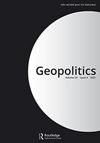Shock Mobilities During Moments of Acute Uncertainty
IF 3.4
1区 社会学
Q1 GEOGRAPHY
引用次数: 2
Abstract
ABSTRACT The COVID-19 pandemic and interventions addressing it raise important questions about human mobility that have geopolitical implications. This forum uses mobility and immobility during the pandemic as lenses onto the ways that routinised state power reacts to acute uncertainties, as well as how these reactions impact politics and societies. Specifically, we propose the concept of “shock mobility” as migratory routines radically reconfigured: emergency flights from epicentres, mass repatriations, lockdowns, quarantines. Patterns of shock mobility and immobility are not new categories of movement, but rather are significant alterations to the timing, duration, intensity, and relations among existing movements. Many of these alterations have been induced by governments’ reactions to the pandemic in both migrant-sending and receiving contexts, which can be especially consequential for migrants in and from the Global South. Our interventions explore these processes by highlighting experiences of Afghans and Kurds along Iran’s borders, Western Africans in Europe, Filipino workers, irregular Bangladeshis in Qatar, Central Americans travelling northwards via Mexico, and rural-urban migrants in India. In total, we argue that tracing shocks’ dynamics in a comparative manner provides an analytical means for assessing the long-term implications of the pandemic, building theories about how and why any particular post-crisis world emerges as it does, and paving the way for future empirical work.在极度不确定时刻的冲击机动
摘要新冠肺炎大流行及其应对措施提出了具有地缘政治影响的人类流动性的重要问题。这个论坛利用疫情期间的流动性和不动性来观察专制的国家权力对严重不确定性的反应方式,以及这些反应如何影响政治和社会。具体而言,我们提出了“休克流动”的概念,即从根本上重新配置移民程序:从震中起飞的紧急航班、大规模遣返、封锁、隔离。冲击活动和不动的模式并不是新的运动类别,而是对现有运动的时间、持续时间、强度和关系的重大改变。其中许多变化是由政府在移民发送和接收环境中对疫情的反应引起的,这对全球南方的移民来说尤其重要。我们的干预措施通过强调伊朗边境的阿富汗人和库尔德人、欧洲的西非人、菲律宾工人、卡塔尔的非正规孟加拉国人、经由墨西哥北上的中美洲人以及印度的农村-城市移民的经历来探索这些过程。总的来说,我们认为,以比较的方式追踪冲击的动态为评估疫情的长期影响提供了一种分析手段,建立了关于任何特定的后危机世界如何以及为什么会出现这种情况的理论,并为未来的实证工作铺平了道路。
本文章由计算机程序翻译,如有差异,请以英文原文为准。
求助全文
约1分钟内获得全文
求助全文
来源期刊

Geopolitics
Multiple-
CiteScore
7.60
自引率
10.30%
发文量
50
期刊介绍:
The study of geopolitics has undergone a major renaissance during the past decade. Addressing a gap in the published periodical literature, this journal seeks to explore the theoretical implications of contemporary geopolitics and geopolitical change with particular reference to territorial problems and issues of state sovereignty . Multidisciplinary in its scope, Geopolitics includes all aspects of the social sciences with particular emphasis on political geography, international relations, the territorial aspects of political science and international law. The journal seeks to maintain a healthy balance between systemic and regional analysis.
 求助内容:
求助内容: 应助结果提醒方式:
应助结果提醒方式:


